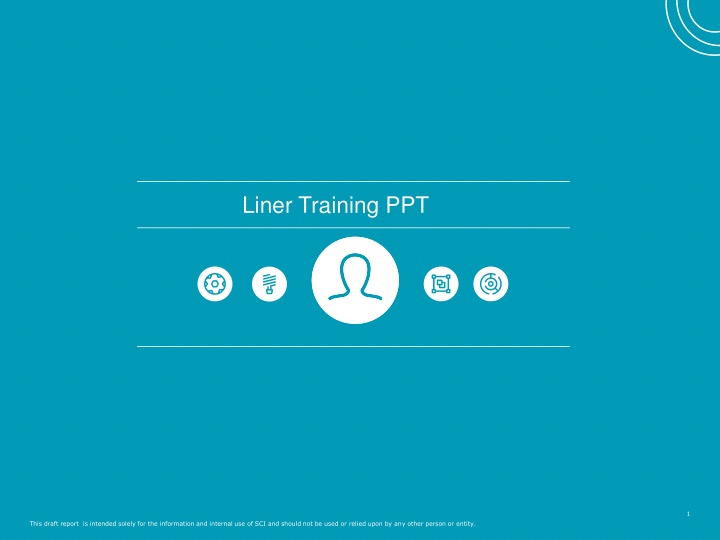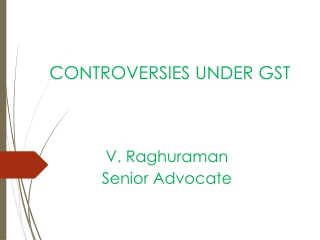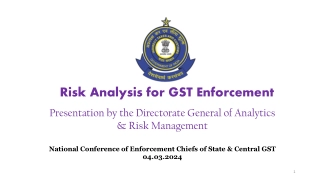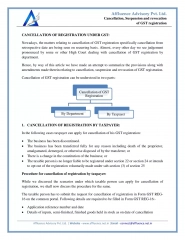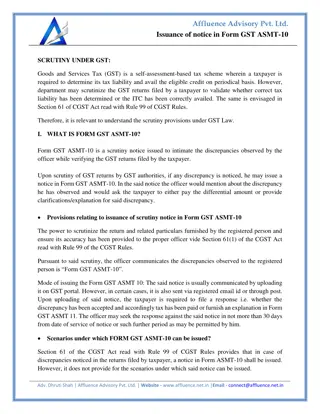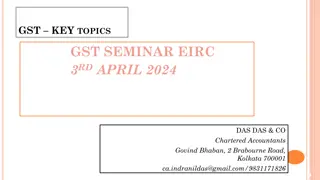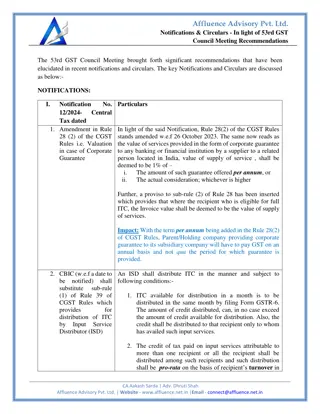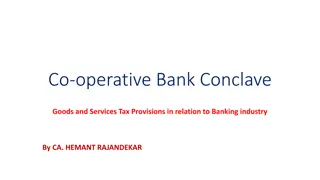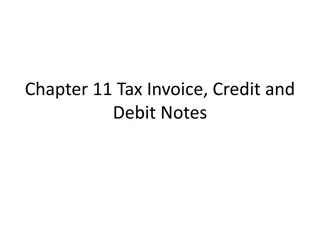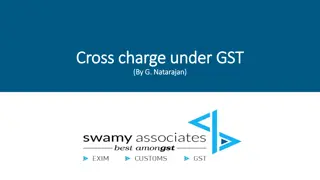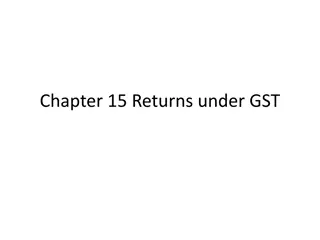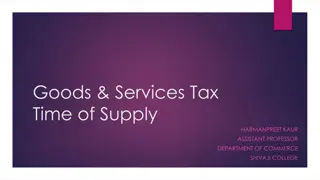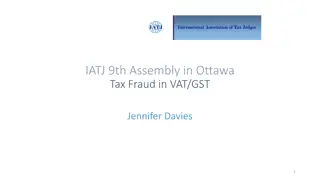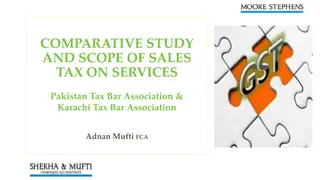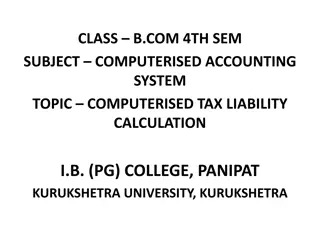Overview of GST Framework in India for Liner Training
This draft report delves into the Goods and Services Tax (GST) framework in India, covering the taxes to be subsumed, duties and taxes to remain, state cesses and surcharges, considerations for the oil and gas industry, and more. It provides insights on the proposed GST structure and its implications for various sectors, including relevant case studies and areas for consideration. The report emphasizes the significance of understanding GST laws and their impact on businesses operating in India.
Download Presentation

Please find below an Image/Link to download the presentation.
The content on the website is provided AS IS for your information and personal use only. It may not be sold, licensed, or shared on other websites without obtaining consent from the author.If you encounter any issues during the download, it is possible that the publisher has removed the file from their server.
You are allowed to download the files provided on this website for personal or commercial use, subject to the condition that they are used lawfully. All files are the property of their respective owners.
The content on the website is provided AS IS for your information and personal use only. It may not be sold, licensed, or shared on other websites without obtaining consent from the author.
E N D
Presentation Transcript
Liner Training PPT 1 This draft report is intended solely for the information and internal use of SCI and should not be used or relied upon by any other person or entity.
Contents GST framework in India Taxes to be subsumed in GST Duties / Taxes to Remain Dimensions of the proposed GST Time of supply of goods Place of supply of goods for L&PS Input Tax Credit Relevant case studies for L&PS Areas for Considerations Questions & Answers 2 This draft report is intended solely for the information and internal use of SCI and should not be used or relied upon by any other person or entity.
GST Framework in India 3 This draft report is intended solely for the information and internal use of SCI and should not be used or relied upon by any other person or entity.
GST Framework in India Taxes to be subsumed in GST State cesses & surcharges on goods & services Taxes on lottery, betting, gambling VAT Entry Tax & Octroi CGST SGST Central Sales Tax Entertainment Tax (except by local bodies) Purchase Tax & Luxury Tax Areas of consideration for oil & gas industry Five petroleum products namely, Crude, Natural Gas, Aviation Turbine Fuel, Motor Spirits and High Speed Diesel proposed to be kept outside ambit of GST GST on these petroleum products proposed to be levied from a notified date recommended by the GST Council 4 This draft report is intended solely for the information and internal use of SCI and should not be used or relied upon by any other person or entity.
GST Framework in India Duties / Taxes to Remain Taxes on liquors and petroleum products Basic Customs Duty Stamp duty Excise duty on tobacco products Property tax and profession tax Toll tax Export duty Environment tax State Electricity Duty 7 5 This draft report is intended solely for the information and internal use of SCI and should not be used or relied upon by any other person or entity.
Concepts under Model GST law Understanding the term Supply Supply is the taxable event under GST law Supply includes all forms of supply of goods and / or services Includes transaction such as sale, transfer, barter, exchange Includes specific activities to be treated as supply without consideration (Schedule I) Supply converges multiple existing taxable events Composite supply is combination of: two or more goods, two or more services, goods and services Schedule II specifies the matters to be treated as Supply of Goods or Services 6 This draft report is intended solely for the information and internal use of SCI and should not be used or relied upon by any other person or entity.
GST Framework in India Dimensions of the proposed GST GST is destination based consumption tax Taxable event of supply of goods / services or both Dual GST: Central GST (CGST) and State GST (SGST) / Union Territory GST (UTGST) IGST on inter-State transactions Imports would be subjected to IGST in addition to BCD and Customs Cess (as duty of customs) GST is not applicable on zero rated supplies Special Industrial Area Schemes to be converted into investment based through their validity period CGST and IGST does not extend to Jammu & Kashmir Dimensions of GST framework? Tax credit mechanism CGST SGST / UTGST IGST CGST Intra-State SGST/UTGST GST Input SGST against: SGST / UTGST IGST Input IGST against: IGST CGST SGST / UTGST IGST Input CGST against: CGST IGST Inter-State (CGST+SGST / UTGST) 7 This draft report is intended solely for the information and internal use of SCI and should not be used or relied upon by any other person or entity.
GST Framework in India Timeof supply of goods Category Goods Services Forward charge Date of Issuance of Invoice The last date on which he is required to issue the invoice Date of making payment Date of issuance of invoice Date on receipt of payment Date of provision of services (date of receipt or credit in the books of account whichever is earlier) Reverse charge Date of receipt of goods Date of making payment Date immediately following thirty days from the date of issue of invoice by the supplier Date of making payment Date immediately following sixty days from the date of issue of invoice by the supplier Advances for supply of goods / services is trigger point (time of supply) for GST; Receipt Voucher to be issued for customer advances 8 This draft report is intended solely for the information and internal use of SCI and should not be used or relied upon by any other person or entity.
GST Framework in India Place of supply relevant for L&PS division transaction Transactions of L&PS division Exceptional case (Transportation of Goods) General Rule Location of Recipient (Address on invoice) Unregistered customer - Indian Foreign customer Location where goods are handed over for Destination of goods 9 This draft report is intended solely for the information and internal use of SCI and should not be used or relied upon by any other person or entity.
GST Framework in India Input Tax Credit: Conditions, Prerequisites & Mechanism Goods and services acquired are subject to input tax restriction such as: Works Contracts resulting in immovable property other than plant and machinery Goods disposed of by way of gift or free samples. Goods and services used for private / personal consumption of employees such as food & beverages, outdoor catering, beauty treatment, health services, club membership, life and health insurance, travel benefits Claimant is required to reverse credit on Common capital goods used for exempt and taxable In case payments are not being made to vendors for inputs/input service within 180 days same, credit proportion to unpaid value is to be reversed. Statutory return has been filed by the registered taxable person. GST charged in respect of such supplies has been actually paid to appropriate government Claimant is in possession of a tax invoice or debit note for Goods and services received / to be received Claimant has received good/ services Claimant must be a registered taxable person. Claimant has received good/ services Utilization of Input Credit against output liability: SGST /UTG ST CGST IGST Input IGST against IGST CGST SGST/UTGST Input SGST/UTGST against - SGST/UTGST IGST Input CGST against CGST IGST 10 This draft report is intended solely for the information and internal use of SCI and should not be used or relied upon by any other person or entity.
GST Framework in India Valuation of taxable supply Transaction Value if: Transaction is between unrelated parties Price is sole consideration for supply = Value of taxable supply Transaction value Inclusions Taxes and duties other than GST Incidental costs/ expenses (such as commission, packing, royalties etc.) Subsidies linked to the supplies Discount or incentive allowed after the supply Exclusions Subsidies received from Government Discount known before supply and linked to invoices Any discount allowed before or at the time of supply as recorded in invoice Expenses incurred as a pure agent (reimbursements) 11 This draft report is intended solely for the information and internal use of SCI and should not be used or relied upon by any other person or entity.
Relevant case studies for L&PS 12 This draft report is intended solely for the information and internal use of SCI and should not be used or relied upon by any other person or entity.
Relevant case studies for L&PS Container transport - Import Freight (Prepaid) SCI Consignor (Singapore) (Mumbai-location) Imported to Karnataka (Consignee) Consignor/Shipper (Ocean freight on foreign port) Place of Supply Levy of Tax Karnataka (Destination of goods) IGST will be applicable. (location of supplier and POS is in different state) The said transaction would not qualify as an export of service 13 This draft report is intended solely for the information and internal use of SCI and should not be used or relied upon by any other person or entity.
Relevant case studies for L&PS Container transport - Import Freight (Collect/FOB) Goods are handed over at Singapore SCI Consignor (Singapore) (Mumbai-location) Imported to Karnataka (Consignee) Consignee (Ocean freight) Place of Supply Levy of Tax Indian customer (Registered) : Karnataka (Location of registered customer) Indian customer (Registered) : IGST (location of supplier and place of supply is in different state) Indian customer (Unregistered) : Singapore (Place where goods are handed over) Indian customer (Unregistered) : IGST (Deeming provision for inter-state trade) 14 This draft report is intended solely for the information and internal use of SCI and should not be used or relied upon by any other person or entity.
Relevant case studies for L&PS Container transport - Export Freight (Prepaid) Goods are handed over at Karnataka SCI Karnataka (Consignor) (Mumbai-location) Exported to Singapore (Consignee) Consignor/Shipper (Ocean freight) Levy of Tax Place of Supply Indian customer (Registered) : IGST (location of supplier and place of supply is in different state) Indian customer (Registered) : Karnataka Singapore (Location of registered customer) Indian customer (Unregistered):Karnataka (Place where goods are handed over) Indian customer (Unregistered) : IGST (location of supplier and place of supply is in different state) 15 This draft report is intended solely for the information and internal use of SCI and should not be used or relied upon by any other person or entity.
Relevant case studies for L&PS Container transport - Export Freight (Collect/FOB) Goods are handed over at Karnataka SCI Karnataka (Consignor) (Mumbai-location) Exported to Singapore (Consignee) Consignee (Ocean freight) Place of Supply Levy of Tax Singapore(Destination of goods) Not applicable. It may qualify as export of service 16 This draft report is intended solely for the information and internal use of SCI and should not be used or relied upon by any other person or entity.
Relevant case studies for L&PS Coastal Freight- Indian Customer Goods are handed over at Gujarat SCI Customer (Gujarat)location) (Mumbai location) Transported to Maharashtra Place of Supply Levy of Tax Indian customer (Registered) : Gujarat (Location of registered customer) Indian customer (Registered) : IGST (location of supplier and place of supply is in different state) Indian customer (Unregistered) : Gujarat (Place where goods are handed over) Indian customer (Unregistered) : IGST (location of supplier and place of supply is in different states) 17 This draft report is intended solely for the information and internal use of SCI and should not be used or relied upon by any other person or entity.
Relevant case studies for L&PS Coastal Freight- Foreign Customer Cargo handed over at Maharashtra Customer (Singapore location) SCI (Mumbai location) Transported to Maharashtra Place of Supply Levy of Tax Maharashtra (Destination of goods) CGST/SGST (Since location of supplier and place of supply is in same state) The said transaction would not qualify as an export of service 18 This draft report is intended solely for the information and internal use of SCI and should not be used or relied upon by any other person or entity.
Relevant case studies for L&PS Operation and Managing vessel (Remuneration received from A&N) Indian customer First schedule point of departure is Gujarat SCI Service receiver (Maharashtra Location) (Mumbai location) Levy of Tax Indian customer (Registered) : CGST+SGST (location of supplier and place of supply is in same state) Place of Supply Indian customer (Registered) : Maharashtra (Location of registered customer) Indian customer (Unregistered): Maharashtra (Location of address of recipient ) Indian customer (Unregistered) : CGST+SGST (location of supplier and place of supply is in same state) Maharashtra (Location of SCI when address of recipient is not available) It is pertinent to note that POS for the said transaction in case of an Indian customer is first schedule point of departure of that conveyance for the journey . However, due to practical challenges that could be faced in deriving first schedule point of departure of that conveyance for the journey, management of SCI has taken a decision to consider POS as per general rule i.e. location of recipient of service The said scenario covers technical fees or management overheads recovered from A&N for managing vessel 19 This draft report is intended solely for the information and internal use of SCI and should not be used or relied upon by any other person or entity.
Relevant case studies for L&PS Operation and Managing vessel Foreign customer SCI Customer (Mumbai location) (Singapore location) Place of Supply Singapore (Location of customer) Levy of Tax Not applicable if it qualifies as export of service Maharashtra (Location of SCI if address of customer Is not available) 20 This draft report is intended solely for the information and internal use of SCI and should not be used or relied upon by any other person or entity.
Relevant case studies for L&PS Detention/storage, Demurrage, Chartering, Slot swapping/Slot sharing and slot selling, Vessel traffic management, Incentive for container stuffing and destuffing,THC, IHC) Indian customer SCI Customer (Gujarat)location) (Mumbai location) Levy of Tax Indian customer (Registered) : IGST (location of supplier and place of supply is in different state) Place of Supply Indian customer (Registered) : Gujarat (Location of registered customer) Indian customer (Unregistered) : Gujarat (Location of address of recipient ) Maharashtra (Location of SCI when address of recipient is not available) Indian customer (Unregistered) : IGST (location of supplier and place of supply is in different state) Foreign customer SCI Customer (Mumbai location) (Singapore location) Place of Supply Singapore (Location of customer) Levy of Tax Not applicable if it qualifies as export of service Maharashtra (Location of SCI if address of customer Is not available) 21 This draft report is intended solely for the information and internal use of SCI and should not be used or relied upon by any other person or entity.
Relevant case studies for L&PS Valuation for Slot swapping/Slot sharing and slot selling Barter transaction is subjected to GST It is suggested that since there is no monetary value involved in certain scenarios of slot sharing being in a nature of barter, open market value should be considered as value of supply and should attract GST. Explanation for open market value open market value of a supply of goods or services or both means the full value in money, excluding the integrated tax, central tax, State tax, Union territory tax and the cess payable by a person in a transaction, where the supplier and the recipient of the supply are not related and price is the sole consideration, to obtain such supply at the same time when the supply being valued is made Suggestion SCI may take a base of the amounts charged for such slots shared when the same is being given to a partner for a fees (for an example, when the slot sharing exceeds certain capacity/amount agreed based on excess usage), SCI may decide similar bases for purpose of discharging GST in the case of slot sharing/swapping. 22 This draft report is intended solely for the information and internal use of SCI and should not be used or relied upon by any other person or entity.
Relevant case studies for L&PS Rebate on income Issue of credit note: Credit note should be issued for time charter in the following cases: - When the taxable value or tax charged in tax invoice is found to exceed the taxable value or tax payable in respect of such supply, - where services supplied are found to be deficient Time limit Details of credit note shall be declared in the return for the month during which such credit note has been issued but not later than: - September following the end of the financial year - The date of furnishing of the relevant annual return whichever is earlier Whether liability can be reversed if credit note is issued? Tax liability can be reduced from output tax liability if the incidence of tax and interest on such supply has been passed on to any other person 23 This draft report is intended solely for the information and internal use of SCI and should not be used or relied upon by any other person or entity.
Relevant case studies for L&PS Sale of equipment on as is where is basis Indian customer Delivery terminates at Gujarat Customer (Gujarat Location) SCI (Mumbai location) Place of Supply Levy of Tax Indian customer: Location where the goods terminates for delivery to recipient Indian customer: IGST (location of supplier and place of supply is in different state) Foreign customer Delivery terminates at Singapore Customer SCI (Singapore Location) (Mumbai location) Levy of Tax Indian customer: Not applicable if it qualifies as export of goods Place of Supply Foreign customer: Location outside India 24 This draft report is intended solely for the information and internal use of SCI and should not be used or relied upon by any other person or entity.
Relevant case studies for L&PS Transactions with A&N Freight for carrying cargo in A&N's vessel Such freight cargo services is being provided by A&N. It is no where SCI s income, since the said freight amount collected by SCI on behalf of A&N is being transferred to A&N based on statements of accounts. GST is not attracted on such disbursement of fund held by SCI on behalf of A&N. However, if it is concluded that such services are provided by SCI and invoicing and requisite documents are prepared in the name of SCI, GST would be leviable by SCI Passage money (Tickets) for transporting passengers in A&N Vessel Such passenger services is being provided by A&N. it is pertinent to note that the exemption for passenger transportation by inland water ways is retained in GST (Entry No.72 of draft list of service). GST is not leviable on such disbursement of fund held by SCI on behalf of A&N. However, if it is concluded that such services are provided by SCI and invoicing and requisite documents are prepared in the name of SCI. GST would not be leviable by SCI since passenger transportation service is notified as an exempt service. 25 This draft report is intended solely for the information and internal use of SCI and should not be used or relied upon by any other person or entity.
Areas for Consideration 26 This draft report is intended solely for the information and internal use of SCI and should not be used or relied upon by any other person or entity.
Areas for Consideration Action Points Particulars Description Input tax credit GST charged on supply of goods and services would be eligible as credit to SCI. SCI would be eligible to take credit in the states where SCI has opted to migrate under GST registration i.e. Maharashtra, Tamil Nadu, West Bengal, Delhi, Andaman & Nicobar. Further on certain services, GST would be payable under reverse charge mechanism as per Notification No. 13/2017- Central Tax and Notification No. 10/2017- Integrated Tax In case of non-payment of value of the goods & tax thereon to the supplier towards goods / services within period 180 from the date of invoice, then credit taken on such invoice needs to be reported in the return of the month immediately following the period of 180 days. The amount of reversal will be added in the output tax liability of the assessee. In addition to output liability, interest from the date of availment of credit till date of addition in the output tax liability. Input tax credit in respect to services would be available only in proportion to taxable and zero rated supplies.. As per Rule of reversal, identification of credit of taxes paid on Input and Input services pertaining to taxable, exempt supplies, zero rated supplies, non business purpose is identified. The tax credit will be reversed provisionally every month. The mannerism with respect to reversal and formula in detail would be explained in report. 27 In case where goods are imported, BCD credit shall not be eligible and IGST credit shall be eligible
Areas for Consideration Action Points Particulars Tax Invoice Description SCl shall issue tax invoice, For supply of service within a period of 30 days from the date of supply of service In case of inward supplies received from unregistered persons liable for reverse charge, invoice shall be issued by SCI on the date of receipt of goods or services from an unregistered vendor. Payment voucher is required to be issued by SCI at the time of making payment to the unregistered supplier. Manner of issuing tax invoices: Original Copy- for Recipient For Supply of Services Duplicate Copy- for Supplier Bill Supply of Bill of supply should be issued in case of exempted supply of goods or services or both or where the supplier chooses to pay tax under composition method. Details of such exempted supplies should be disclosed in GST return in the prescribed manner. Supplier may not issue a bill of supply if the value of the goods or services or both supplied is less than INR 200 and subject to the following conditions namely, The recipient is not a registered person and The recipient does not require such invoice However, supplier shall be required to issue a consolidated bill of supply for such supplies at the close of each day in respect of all such supplies 28
Areas for Consideration Action Points Particulars Description Credit or Debit note Credit Note shall be issued by supplier when in the invoice issued by vendor, tax charged and taxable value is more than the taxable value and tax payable of the goods and/ services or where goods supplied are returned by SCI to vendor or goods and/ service received are deficient Debit note shall be issued by supplier when in the invoice issued by vendor, tax charged and taxable value is less than the taxable value and tax payable or price is revised upward Credit or debit note should be issued on or before Filing return for the month of September following the end of the F.Y. to which such invoice relating to debit note pertains or Furnishing of the relevant annual return; whichever is earlier. in order to make necessary rectification in returns. 29
Areas for Consideration Action Points Particulars Description Price Adjustment For upward revision, raise a debit note / suppl. invoice, charging GST For a downward revision, raise a credit note either with GST or only on basic price All adjustments need to be reported during the month of transaction or before filing of annual return Debit / credit notes should not be aggregated for multiple invoices (each debit / credit note should refer to a single invoice) Discounts All upfront discounts should be provided on basic price and GST should be applied on price after discount Other post supply adjustment All post supply discounts should be in the form of a credit note with GST or only on basic price. No supply of additional quantities of items in lieu of discounts, as the same may attract GST. 30
Areas for Consideration Particulars to be furnished Revised invoice/ Debit or credit note ISD invoice/ ISD credit note Sr.No. Particulars Tax invoice Bill of supply Receipt voucher Refund voucher Payment voucher Delivery challan Rule 1 Rule 4 Rule 5 Rule 6 Rule 7 Rule 8 Rule 9 Rule 10 1 Name, address and GSTIN of the supplier/ISD/Consigner; Consecutive serial number not exceeding sixteen characters containing only alphabets or numerals or special characters unique for a financial year 2 3 Date of its issue; Name, address and GSTIN/ Unique ID Number, if registered, of the recipient/consignee; Number and date of receipt voucher issued in accoradance with provisions of sub-rule 5 Name and address of the recipient and the address of delivery, along with the name of State and its code, if such recipient is unregistered and where value of supply is fifty thousand rupees or more 4 5 6 7 HSN code of goods or Accounting Code of services 8 HSN Code of Goods 9 Description of goods or services; 10 Amount paid 11 Amount of refund made Quantity in case of goods and unit or Unique Quantity Code thereof; 12 31
Areas for Consideration Particulars to be furnished Revised invoice/ Debit or credit note ISD invoice/ ISD credit note Sr.No. Particulars Tax invoice Bill of supply Receipt voucher Refund voucher Payment voucher Delivery challan Rule 1 Rule 4 Rule 5 Rule 6 Rule 7 Rule 8 Rule 9 Rule 10 14 Total value of goods or services; Taxable value of goods or services taking into account discount or abatement, if any Value of supply of goods or services taking into account discount or abatement, if any Rate of tax (central tax, state tax, integrated tax, union territory tax or Cess) Amount of tax charged/payable in respect of taxable goods or services (central tax, state tax, integrated tax, union territory tax or Cess) Place of supply along with the name of State, in case of a supply in the course of inter-State trade or commerce; address of delivery where the same is different from the place of supply; 15 16 17 18 19 20 21 Whether the tax is payable on reverse charge; 22 Amount of advance taken The word Revised Invoice wherever applicable indicated prominently Signature or digital signature of the supplier /Input service distributor or his authorized representative Signature or digital signature of the recipient or his authorized representative 23 24 25 26 Nature of document Serial number and date of the corresponding tax invoice /bill of supply Taxable value of goods or services, rate of tax and the amount of the tax credited / debited to the recipient Name, address and GSTIN of the recipient to whom the credit is distributed 27 28 29 30 Amount of the credit distributed; 32
Areas for Consideration Particulars to be furnished Revised invoice/ Debit or credit note ISD invoice/ ISD credit note Sr.No. Particulars Tax invoice Bill of supply Receipt voucher Refund voucher Payment voucher Delivery challan Rule 1 Rule 4 Rule 5 Rule 6 Rule 7 Rule 8 Rule 9 Rule 10 Endorsement on invoice "SUPPLY MEANT FOR EXPORT ON PAYMENT OF IGST" OR "SUPPLY MEANT FOR EXPORT UNDER BOND OR LETTER OF UNDERTAKING WITHOUT PAYMENT OF IGST" Name and address of the recipient and the address of delivery, along with the name of country of destination Endorsement on invoice "SUPPLY MEANT FOR EXPORT ON PAYMENT OF IGST" OR "SUPPLY MEANT FOR EXPORT UNDER BOND OR LETTER OF UNDERTAKING WITHOUT PAYMENT OF IGST" Name and address of the recipient and the address of delivery, along with the name of country of destination 31 32 Shall contain words "INPUT TAX CREDIT NOT ADMISSIBLE" if tax is payable in purusance to Section 74, 129 & 130 33 33
Areas for Consideration Key statutory filings and returns Return Details Timelines Form GSTR 1 Details of outward supplies of goods and/or Services By 10th of the following month Form GSTR 2 Details of inward supplies of goods and/or services By 15th of the following month Form GSTR - 3 Within 20days of the following month Monthly return on the basis of finalisation of details mentioned above with payment of tax and other details Form GSTR - 4 Registered person paying tax under Composition Method furnish quarterly return of turnover, inward supplies with payment of tax and other details. Within 18 days after end of such quarter Form GSTR 5 Return for Non-Resident foreign taxable person Within 20 days after end of the month or within 7 days after the last day of the period of registration, whichever is earlier. Form GSTR 6 ISD return Within 13 days of the end of the month Form GSTR 7 Returns for tax deducted at source Within 10 days after end of the month in which deduction is made Form GSTR 8 Within 10 days after end of the month Details of supplies effected through e-commerce operator and the amount of tax collected as required under sub-section (1) of section 43C Form GSTR 9 Annual return By 31 Dec of the following the end of such FY Form GSTR - 9B Reconciliation statement 34
GSTR-1 Outward supply includes Supplies Supplies made to registered dealers during the month Inter state supplies made to unregistered dealers during the month (for invoice more than 2.5 lacs) Supplies made to unregistered dealers intrastate and interstate less than 2.5 lacs Amendments to any of the above for supplies made in the earlier months Debit / Credit Note Debit / Credit notes issued during the month including reverse charge Amendments to any of the earlier periods debit / credit notes Exports Supplies exported including deemed exports made by payment of GST or without payment of GST during the month Amendments to any of the supplies exported including deemed exports of earlier months Exempted supplies, Nil rated supplies and non GST supplies Summary of all the interstate / intrastate supplies to registered and unregistered person during the month Advances Tax liability arising in the current tax period where invoice is not issued in the current tax period Invoices issued in the current tax period for which tax was already paid earlier Amendments in the tax liability arising on account of non issuance of invoice in earlier period Invoices issued Invoices issued during the month including inward supplies received from unregistered person liable for reverse charge 35
GSTR-2 Inward supply includes Supplies Received Supplies received from registered dealers during the month Supplies received from unregistered dealers during the month including receipts under reverse charge Amendments to any of the above for supplies made in the earlier months Debit / Credit Note Debit / Credit notes received during the month including reverse charge Amendments to any of the earlier periods debit / credit notes Imports Goods/Capital goods and Services imported during the month Amendments to any of the supplies imported of earlier months Exempted supplies, Nil rated supplies and non GST supplies & supplies received from composition person This will include summary of all supplies received from composition taxable person other exempt / Nil / non GST supplies during the month Credit received ISD credit, TDS credit, TCS credit and ITC received during the month will be reflected in separate tables on GSTR-2 Advances Tax liability arising under reverse charge arising on account of time of supply where invoice is not issued in the current tax period and amendments made for earlier tax period Invoices issued in the current tax period for which tax under reverse charge has already been paid ITC Reversal Any ITC reversal during the month and any amendment in the ITC claimed in the earlier period will be reported under this head. 36
GSTR-9 Annual return Details of Expenditure Purchase of goods and services on inter-state basis, intra-state basis and imports on which ITC is availed Purchase of goods and services where no ITC is availed Sales returns of goods Details of expenditure other than purchases Details of Income Supply of goods and services on inter-state basis, intra-state basis and export on which GST is paid Supply of goods and services on export where no GST is paid Other Supply of goods and services where no GST is paid (Exempted, Nil rated, Non GST supplies) Purchase return of goods and services Details of Income other than from supplies Return reconciliation statement Reconciliation of tax paid and tax payable as per audited accounts Other amount Details of orders containing arrears of tax payable arising from audit/assessments along with current status of the order Details of refund claims along with current status of claim Profit as per profit and loss statement Gross profit, Profit after tax and Net profit as per profit and loss account Notes If the turnover of the registered taxable person exceed INR 1 crore shall get his annual accounts audited by a chartered accountant or cost accountant and he shall furnish a copy of audited annual accounts and a reconciliation statement, duly certified in FORM GSTR-9B 37
Interdependence pertaining to return filing steps GSTR1 GSTR2A GSTR2 By 10th 15th to 17th Auto populated Amended GSTR1 GSTR3 GSTR1A 20th - Auto populated 17th to 20th Auto populated Add Accept (Provisional) Modify including rejection 38 38 Presentation for vendors
Area for Consideration Impact of Anti-profiteering clause 1 1 Section 171 Anti Profiteering Measure has been incorporated under GST Bill 2 Anti Profiteering Measure has been inserted to examine whether reduction in the price on account of any reduction in rate have actually resulted in a commensurate reduction in the price of the said goods/services supplied by them 3 Authorities shall have power to impose penalty in cases where it finds that the price being charged has not been reduced as aforesaid 39
Areas for Consideration Action Points GST Compliance rating Every taxable person shall be assigned a GST compliance rating score based on his record of compliance. Such scores would be determined on the basis of certain parameters. SCI should use this periodic ratings should be used for selection of vendors in order to avoid any business agreements with GST non-compliant vendor. Key Transitional Aspects Amount of unutilized credit under current law shall be carried forward under GST regime subject to the condition that the same shall be eligible as per GST law. In relation to above, following action points are suggested for SCI: To undertake the review of transactions (of at least prior to one year) for ascertaining the missed out credits. All RCM payments should be made prior to GST regime so that credit can be carried forward. Payments to the vendors outstanding for more that 3 months should be made before GST regime so that credit of the same will not be required to be reversed and credit in relation to the same can be carried forward. Any credit note/debit note should be settled prior to GST regime so that correct credit balance shall be carried forward. 40
Areas for Consideration Action Points Key Transitional Aspects (cont..) Vendors should be requested to issue invoices pertaining to pre GST regime at least 15 days before the appointed date for GST regime. For the same, letters may be issued to the said vendors. All the service invoices should be booked at earliest in order to take CENVAT credit and carry forward as opening balance under GST regime. Any price revision post GST regime should be supported by credit note or debit note and applicable GST therein. In case of procurement of services, if the advance has already been paid then vendor shall be required to discharge service tax on the same (as per transitional provisions). As a consequence, no GST shall be collected on the said amount. 41
